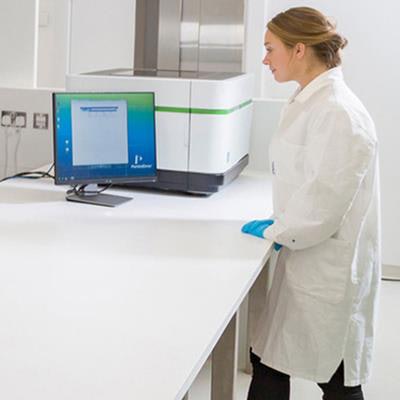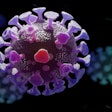
PerkinElmer's Vanadis targeted cell-free DNA (cfDNA) test had high sensitivity and specificity for finding fetal chromosomal abnormalities in high-risk pregnant women in a European study published August 19 in the journal Prenatal Diagnosis. The company believes the results support the test's potential as a lower-cost option for first-line genetic screening.
PerkinElmer describes its Vanadis noninvasive prenatal test as a new, nonsequencing cfDNA method based on imaging and counting specific chromosome targets. The product has the CE-IVD Mark in Europe and is classified as a research use only (RUO) assay in the U.S.
The researchers evaluated the product in 1,200 plasma samples prospectively and retrospectively collected from women with single pregnancies who were at high risk of having a child with a trisomy disorder. The samples were collected at centers in Sweden, England, and France, and screened for Down syndrome, Edwards syndrome, and Patau syndrome, according to lead author Olle Ericsson, managing director at PerkinElmer subsidiary Vanadis Diagnostics, and colleagues.
From the samples, 158 aneuploidies were reported. Sensitivity for Edwards syndrome was lower than for Down syndrome and Patau syndrome, which is in line with a meta-analysis of noninvasive prenatal tests, the authors noted.
| Sensitivity and specificity for Vanadis cfDNA test in high-risk pregnant women | |||
| Condition | No. of cases by aneuploidy type | Sensitivity | Specificity |
| Down syndrome (trisomy 21) | 112 | 100% | 100% |
| Edwards syndrome (trisomy 18) | 36 | 89% | 99.5% |
| Patau syndrome (trisomy 13) | 10 | 100% | 99.9% |
Stuck in 2nd tier
Currently, prenatal screening for these disorders is done with multiple serum and ultrasound markers, while whole-genome sequencing is held in reserve, the authors noted.
"During the last decade, clinical implementation studies of maternal plasma [cell-free DNA] testing has demonstrated a much higher sensitivity and specificity for these trisomies," Ericsson et al wrote. "However, where cfDNA screening has been adopted in public health programs, it is mostly as a second‐tier test."
"We believe the high‐cost structure and complexity of sequencing and microarray‐based cfDNA testing is the main reason why cfDNA testing has not yet been widely adopted as a first‐tier aneuploidy test," they added.
 PerkinElmer is positioning its Vanadis system (above) as a targeted, more cost-effective cfDNA test. According to the company, a single laboratory employee can operate the system at a throughput of up to 20,000 samples per year. Image courtesy of PerkinElmer.
PerkinElmer is positioning its Vanadis system (above) as a targeted, more cost-effective cfDNA test. According to the company, a single laboratory employee can operate the system at a throughput of up to 20,000 samples per year. Image courtesy of PerkinElmer.In addition to the trisomy results reported, the test was accurate in 975 cases (99.6%) for determining the sex of the fetus in an analysis of 979 of the samples. There were five test failures, which the authors deemed to be a low rate but one that can still be improved.
"In this study, only a single sample per patient was analyzed," Ericsson and colleagues wrote. "A rerun strategy based on leftover samples of the first pass assay failures is likely to resolve any technical failures since they are not related to sample characteristics."
PerkinElmer believes that its test is highly automated and does not require specialized personnel or much training to use.
"The Vanadis system enables a reduction in cost and workflow complexity without compromising on performance; consequently, the test can be made available to a wider population of pregnant women," Ericsson and colleagues wrote.
Watching the market evolve
Prenatal testing services represent nearly a billion dollar market worldwide, according to an upcoming report from Kalorama Information, a sister company of LabPulse.com.
"It's no surprise vendors are launching innovative diagnostic systems to supply that test market," Kalorama Publisher Bruce Carlson commented. "PerkinElmer is betting on a high-demand area of diagnostics, and that a targeted approach will beat whole-genome sequencing."
"That's a contest market watchers will be focused on in the next few years," he said.



















